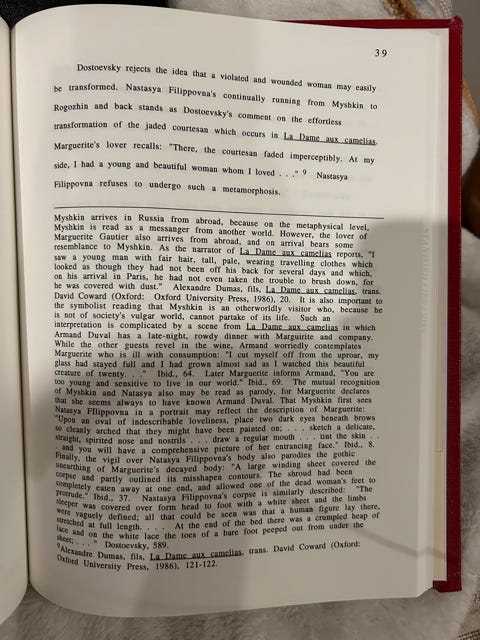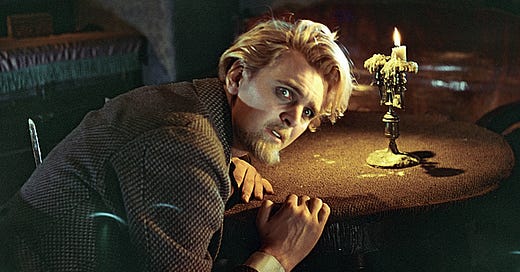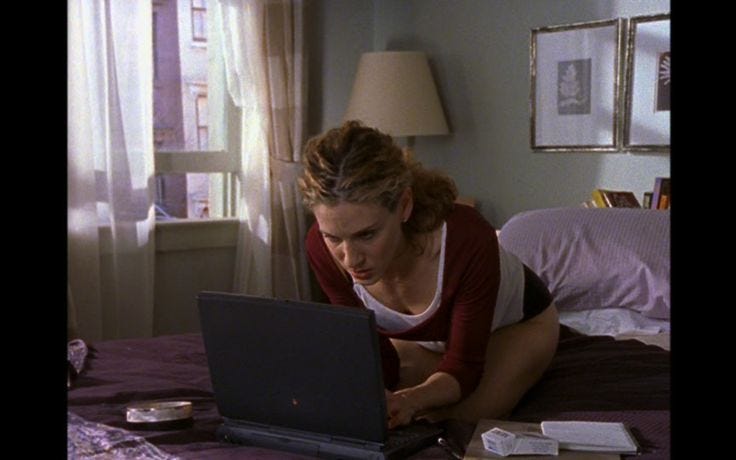Excited, in the way Elif Batuman uses the word...again
Stanford Alumni Association, are you there? It's me, Emily
I’ve been thinking about Elif Batuman following clues because she read a book where the author discusses following clues. (I am always thinking about what she’s written, even when I’m being paid to think about other things.)
I asked one of my Russian coworkers if he’d ever read Dostoyevsky’s The Idiot and after he said, “Of course,” he asked why I was reading it. Well, because I’m sure that Elif Batuman left behind clues in her version of The Idiot that I can only find if I read Dostoevsky’s. (Selin feels far more baffled at new human experiences than Prince Myshkin does so maybe I need to keep reading (and re-reading) until I see what Batuman saw.)
So I’m reading it. And it’s difficult. Not only because the $1.00 copy I got at a library sale doesn’t have any footnotes for context but because it’s set in 1860’s Russia and I have absolutely no idea what 1860’s Russia could possibly be like1. My coworker tracked down a Soviet-era film adaptation with English subtitles and sent it to me and it was only when the main character, Prince Myshkin, appeared on screen dressed like Colonel Sanders that I realized that in the 1860’s, it was the 1860’s everywhere. For the life of me, I can’t imagine why I thought that 1860’s Russia would involve dress or formality wildly different than what was going on in the American South2.
Anyway. There I am, grinding through Part I and thinking to myself, “Why does anyone put up with Natasya Filippovna?” She waltzes into to other people’s homes and insults them, she laughs loudly in people’s faces, she keeps puzzling company, and she openly hates almost everyone. Why do people not turn her away at the door? Why does Ganya attempt to swear himself to her? Why does she treat people like that?
(And if I’m contrasting with Batuman’s work, who is the Natasya Filippovna in her story? Is there one? Are there any character archetypes from Dostoyevsky’s work that were purposefully put in Batuman’s?)
A friend that hasn’t read The Second Sex but who has patiently listened to my periodic synopses said, “I wonder what you’d make of this from a Second Sex perspective.”
And then I watched Colonel Sanders get backhanded in a room full of “polite society gentlemen” by a man he’s known for less than 12 hours over a woman that everyone hates.
For a novel about Christianity and morality and the difficulty of living ones life while trying to be altruistic, Dostoyevsky somehow wrote about “the woman question”.
Q: Why does anyone put up with Natasya Filippovna?
A: Because her guardian, Totsky, is so blindingly wealthy that he can offer a 75,000 Ruble dowry for her.
Q: Why does she treat people like that?
A: Because it’s the only thing she can do from the confines of being a woman in the 1860’s. Natasya Filippovna’s preferences don’t matter when Totsky has money to marry her off.
Natasya Filippovna wants agency and the structure of the society around her doesn’t give her any. So she’s angry, and she tries valiantly to get out, and it doesn’t work. And it all reminds me of de Beauvoir’s arguments in The Second Sex, her clear lamentation of the lot women have in life; the way she outlines the archetypes women fall into based on their situations whether it be playing-nice or becoming a wicked spinster.
And then Becca Rothfield wrote about the shortcomings of the Discourse about young people not wanting kids:
what if we at least considered the very glaring possibility that the decline in birth rates may be an expression of female agency?
What is Part One of Dostoyevsky’s The Idiot if not an expression of the desire for female agency?3
And I want to read about that. I want to read the “Yes, and?”
So I emailed Stanford’s library and asked if they could inter-library loan me a dissertation that may or may not dissect The Idiot through the lens of The Second Sex and the only bound copy of someone else’s master’s thesis now sits on my coffee table and I am absolutely in awe4.

The librarian at my public, non-university affiliated library, explained that should this copy be damaged or lost, I would owe someone (Stanford?) $85.00. There is no digital copy of this work. The abstract hasn’t been so much as scanned and xerox burned. The author, Andrea Bennett Smith, doesn’t list an email or a phone number. If she defended her master’s thesis in 1990 at the same age I did, she’d be 61 today; who knows if she has a box of her old master’s paperwork, the notes she kept before typing up her thesis, the books she referenced with dog eared and highlighted pages. Who knows if she ever thinks about Russian literature. How could $85.00 replace any of that?
So I’m standing there, holding the only copy of this work that is unable to be recreated and I feel excited in the way Elif Batuman uses the word. And it’s raining outside and I’m thinking, “Oh my god, I didn’t even bring a bag or an umbrella or a jacket and I’m going to take this book out in the rain!”
And then the librarian tells me that because this isn’t a special collection item, I can just “toss it in the drop box” when I’m done.
And I don’t even particularly care about Russian literature, or any country’s literature—I just like good writing, which is why I cling to Batuman’s The Idiot and Either/Or like life preservers, it’s why I subscribe and dutifully read her substack.
And even if Elif Batuman is a woman and loves women and writes about women, she’s not writing about women the way I aim to or the way de Beauvoir did. Which is just as well because Dostoyevsky didn’t wake up and decide to tackle “the woman problem” when he wrote The Idiot but he brought it into a story about society and how people relate to one another across class divides in such a way that he can’t have missed how women existed and moved around his patriarchal world in 19th century Russia5, a time and place I can’t even begin to imagine.
And Andrea Bennett Smith, with her white-out fixed signature page, wrote about what we can and can’t know about Dostoyevsky’s views and how to read a story that is both a part of someone and apart from someone.
Some quotes from the thesis,
“…heroines of male fiction serve a purpose that ultimately has little to do with women: these heroines are used lavishly in a discourse of male self-definition.” Quoted by A. B. Smith from Barbara Heldt6
“…rebelliousness is never allowed to triumph within the fiction”7
Regarding Natasya Filippovna as contrasted with Aglaia Epanchin, “The girl protected in the bosom of the family is no safer than the outraged orphan.”8
“Education is, from Totsky’s point of view, the blade which cuts promising young girls into glittering society gems.”9
“Until Natasya Filippovna left Totsky’s remote provincial estate she too had never been anywhere and had always been at “home”10, as though she too were “corked up in a bottle.” Aglaia’s frequent outbursts are uncontrollable protests against the strictures of her upbringing. In Aglaia’s case, the bottle — a mass produced bottle — maybe read as the education engineered by her family, and Aglaia herself or any girl of her position as something to be poured in and stoppered up. But fermentation has set in.”11
“Marriage is the means by which men try to control women.”12
One of the most striking parts of reading de Beauvoir’s The Second Sex was how timeless it felt, despite being published when my grandparents weren’t even school age, if they existed at all. And now, with the only copy of someone else’s thesis sitting on my coffee table, I’m reading a work published to no fanfare before I was born that feels just as timeless.
And I wouldn’t own the coffee table, or pay rent in the apartment that is all my own, where I can light candles and have candy and cake for dinner13, if I hadn’t strained against the cork on the bottle trying to keep me playing small, the cork that would prefer I don’t read de Beauvoir and that I don’t think deeply and chronically about what it means (if anything) to be (or not to be) a woman.
Elif posted a new Substack that touches on the isolation of authors from “ordinary life” while expecting them to write about “ordinary life” (what is ordinary about being whisked away to give NYT interviews and do vaguely intrusive photo shoots again and again?)14 She mentioned not wanting to take pictures and I can only guess not wanting to be set apart from others by having absolute strangers badger her for photos and one-liners while she’s waiting for coffee.
I have to wonder what I would do if I saw Elif Batuman walking down the street. (I usually get a struck look and then make comments to my friends about, “Is that Carlos Sainz? What is he doing at an Oktoberfest when he has a GP in Singapore!”)
I have to wonder if in my loving of Batuman’s novels, I’ve idolized her as being some other worldly being, capable of penning such works from a place apart from the real world where teenage girls go off to college and have baffling experiences with people who refuse to say what they mean and people who only say what they mean while trying to decide what shoes to wear and what music to listen to and if university professors are full of shit.
I tried telling my coworker about The Great with Elle Fanning and gave up for obvious reasons.
It’s like when you find out Anne Frank and MLK Jr. were born in the same year.
Andrea Bennett Smith and Barbara Heldt would dissagree, probably
A “Woman Question” Reading of The Idiot, by Andrea Bennett Smith 1990
Smith’s argument in short…kind of, you’ll have to read the thesis
Heldt, Barbara. Terrible Perfection. Bloomington: Indiana University Press, 1987
Also Barbara Heldt
Robin Miller. Dotsoevsky and “The Idiot” Cambridge: Harvard University Press, 1981
Also Andrea Bennett Smith
Is this the antithesis to Jerry Seinfeld’s “Out” monologue?
Also Andrea Bennett Smith
Ibid (I had to google what this meant)
Girl dinner — except I have to stop doing this because too much sugar before bed keeps me up at night
Becca Rothfeld wrote about Sally Rooney too! And it felt very exciting to see someone else whose writing I enjoy, that is also part of the Elif Batuman extended cinematic universe, feel meh about Sally Rooney





